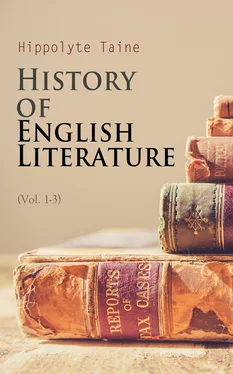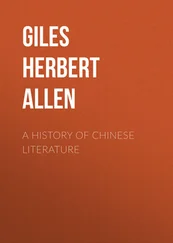Table of Contents
Under this native barbarism there were noble dispositions, unknown to the Roman world, which were destined to produce a better people out of its ruins. In the first place, "a certain earnestness, which leads them out of frivolous sentiments to noble ones." [36]From their origin in Germany this is what we find them, severe in manners, with grave inclinations and a manly dignity. They live solitary, each one near the spring or the wood which has taken his fancy. [37]Even in villages the cottages were detached; they must have independence and free air. They had no taste for voluptuousness; love was tardy, education severe, their food simple; all the recreation they indulged in was the hunting of the aurochs, and a dance amongst naked swords. Violent intoxication and perilous wagers were their weakest points; they sought in preference not mild pleasures, but strong excitement. In everything, even in their rude and masculine instincts, they were men. Each in his own home, on his land and in his hut, was his own master, upright and free, in no wise restrained or shackled. If the commonweal received anything from him, it was because he gave it. He gave his vote in arms in all great conferences, passed judgment in the assembly, made alliances and wars on his own account, moved from place to place, showed activity and daring. [38]The modern Englishman existed entire in this Saxon. If he bends, it is because he is quite willing to bend; he is no less capable of self-denial than of independence; self-sacrifice is not uncommon, a man cares not for his blood or his life. In Homer the warrior often gives way, and is not blamed if he flees. In the Sagas, in the Edda, he must be over-brave; in Germany the coward is drowned in the mud, under a hurdle. Through all outbreaks of primitive brutality gleams obscurely the grand idea of duty, which is, the self-constraint exercised in view of some noble end. Marriage was pure amongst them, chastity instinctive. Amongst the Saxons the adulterer was punished by death; the adulteress was obliged to hang herself, or was stabbed by the knives of her companions. The wives of the Cimbrians, when they could not obtain from Marius assurance of their chastity, slew themselves with their own hands. They thought there was something sacred in a woman; they married but one, and kept faith with her. In fifteen centuries the idea of marriage is unchanged amongst them. The wife, on entering her husband's home, is aware that she gives herself altogether, [39]"that she will have but one body, one life with him; that she will have no thought, no desire beyond; that she will be the companion of his perils and labors; that she will suffer and dare as much as he, both in peace and war." And he, like her, knows that he gives himself. Having chosen his chief, he forgets himself in him, assigns to him his own glory, serves him to the death. "He is infamous as long as he lives, who returns from the field of battle without his chief." [40]It was on this voluntary subordination that feudal society was based. Man in this race can accept a superior, can be capable of devotion and respect. Thrown back upon himself by the gloom and severity of his climate, he has discovered moral beauty while others discover sensuous beauty. This kind of naked brute, who lies all day by his fireside, sluggish and dirty, always eating and drinking, [41]whose rusty faculties cannot follow the clear and fine outlines of happily created poetic forms, catches a glimpse of the sublime in his troubled dreams. He does not see it, but simply feels it; his religion is already within, as it will be in the sixteenth century, when he will cast off the sensuous worship imported from Rome, and hallow the faith of the heart. [42]His gods are not enclosed in walls; he has no idols. What he designates by divine names is something invisible and grand, which floats through nature, and is conceived beyond nature, [43]a mysterious infinity which the sense cannot touch, but which "reverence alone can feel"; and when, later on, the legends define and alter this vague divination of natural powers, one idea remains at the bottom of this chaos of giant-dreams, namely, that the world is a warfare, and heroism the highest good.
In the beginning, say the old Icelandic legends, [44]there were two worlds, Niflheim the frozen, and Muspell the burning. From the falling snow-flakes was born the giant Ymir. "There was in times of old, where Ymir dwelt, nor sand nor sea, nor gelid waves; earth existed not, nor heaven above; 'twas a chaotic chasm, and grass nowhere." There was but Ymir, the horrible frozen Ocean, with his children, sprung from his feet and his armpits; then their shapeless progeny, Terrors of the abyss, barren Mountains, Whirlwinds of the North, and other malevolent beings, enemies of the sun and of life; then the cow Andhumbla, born also of melting snow, brings to light, whilst licking the hoar-frost from the rocks, a man Bur, whose grandsons kill the giant Ymir. "From his flesh the earth was formed, and from his bones the hills, the heaven from the skull of that ice-cold giant, and from his blood the sea; but of his brains the heavy clouds are all created." Then arose war between the monsters of winter and the luminous fertile gods, Odin the founder, Baldur the mild and benevolent, Thor the summer-thunder, who purifies the air, and nourishes the earth with showers. Long fought the gods against the frozen Jötuns, against the dark bestial powers, the Wolf Fenrir, the great Serpent, whom they drown in the sea, the treacherous Loki, whom they bind to the rocks, beneath a viper whose venom drops continually on his face. Long will the heroes who by a bloody death deserve to be placed "in the halls of Odin, and there wage a combat every day," assist the gods in their mighty war. A day will, however, arrive when gods and men will be conquered. Then
"trembles Yggdrasil's ash yet standing; groans that ancient tree, and the Jötun Loki is loosed. The shadows groan on the ways of Hel, [45]until the fire of Surt has consumed the tree. Hrym steers from the east, the waters rise, the mundane snake is coiled in jötun-rage. The worm beats the water, and the eagle screams; the pale of beak tears carcasses; (the ship) Naglfar is loosed. Surt from the South comes with flickering flame; shines from his sword the Val-god's sun. The stony hills are dashed together, the giantesses totter; men tread the path of Hel, and heaven is cloven. The sun darkens, earth in ocean sinks, fall from heaven the bright stars, fire's breath assails the all-nourishing tree, towering fire plays against heaven itself." [46]
The gods perish, devoured one by one by the monsters; and the celestial legend, sad and grand now like the life of man, bears witness to the hearts of warriors and heroes.
There is no fear of pain, no care for life; they count it as dross when the idea has seized upon them. The trembling of the nerves, the repugnance of animal instinct which starts back before wounds and death, are all lost in an irresistible determination. See how in their epic [47]the sublime springs up amid the horrible, like a bright purple flower amid a pool of blood. Sigurd has plunged his sword into the dragon Fafnir, and at that very moment they looked on one another; and Fafnir asks, as he dies, "Who art thou? and who is thy father? and what thy kin, that thou wert so hardy as to bear weapons against me? A hardy heart urged me on thereto, and a strong hand and this sharp sword.... Seldom hath hardy eld a faint-heart youth." After this triumphant eagle's cry Sigurd cuts out the worm's heart; but Regin, brother of Fafnir, drinks blood from the wound, and falls asleep. Sigurd, who was roasting the heart, raises his finger thoughtlessly to his lips. Forthwith he understands the language of the birds. The eagles scream above him in the branches. They warn him to mistrust Regin. Sigurd cuts off the latter's head, eats of Fafnir's heart, drinks his blood and his brother's. Amongst all these murders their courage and poetry grow. Sigurd has subdued Brynhild, the untamed maiden, by passing through the flaming fire; they share one couch for three nights, his naked sword betwixt them. "Nor the damsel did he kiss, nor did the Hunnish king to his arm lift her. He the blooming maid to Giuki's son delivered," because, according to his oath, he must send her to her betrothed Gunnar. She, setting her love upon him, "Alone she sat without, at eve of day, began aloud with herself to speak: 'Sigurd must be mine; I must die, or that blooming youth clasp in my arms.'" But seeing him married, she brings about his death. "Laughed then Brynhild, Budli's daughter, once only, from her whole soul, when in her bed she listened to the loud lament of Giuki's daughter." She put on her golden corslet, pierced herself with the sword's point, and as a last request said:
Читать дальше












